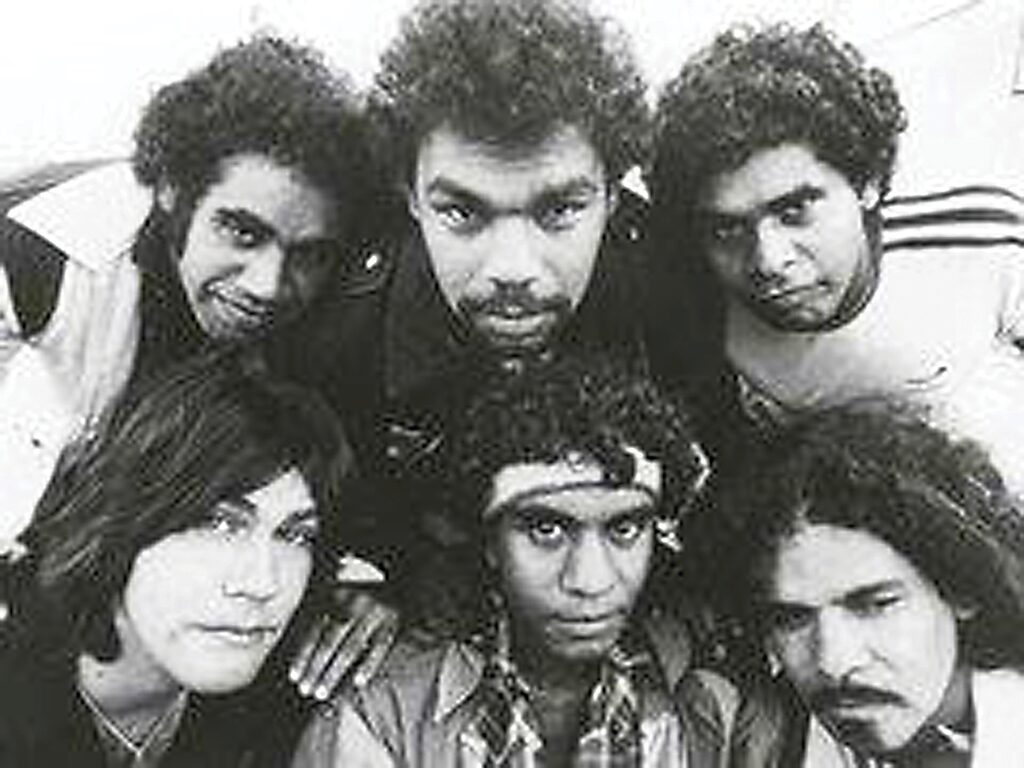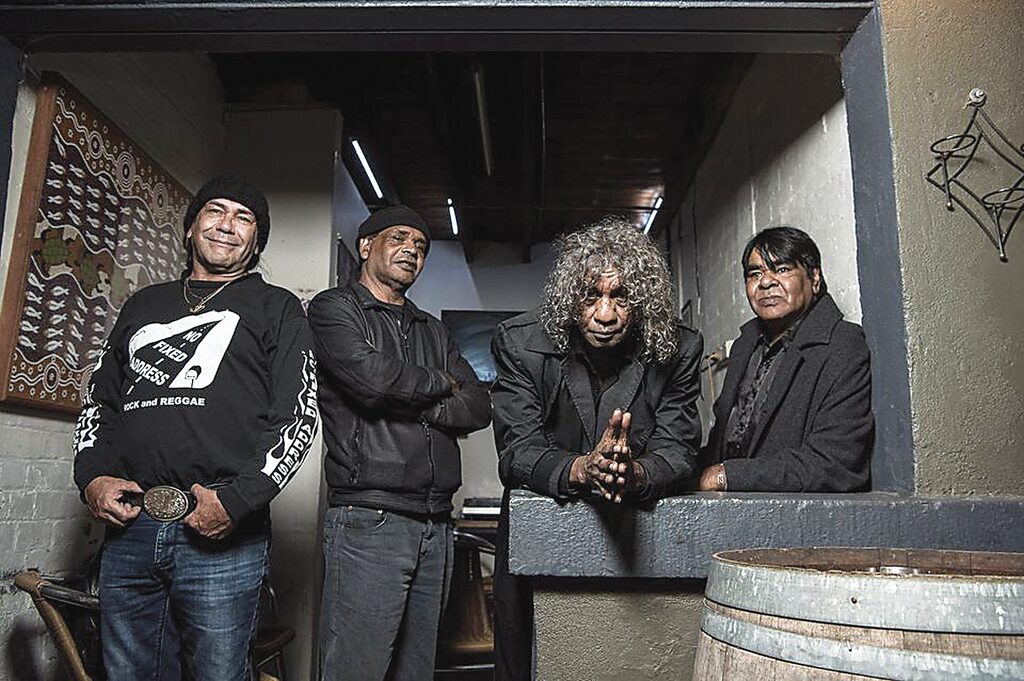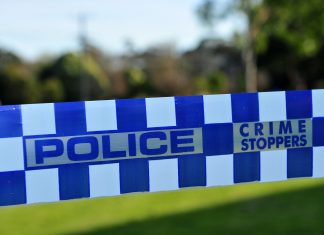TOM HAYES
By TOM HAYES
SOME people dream of travelling the world, but a local man got travel the world, spread a message with good friends and do the thing he loved in the meantime. Ricky Harrison, an Aboriginal man who grew up in Morwell, has shared his story about his career as a songwriter and band member, including all of the highs and the lows. Now aged 63, Mr Harrison was able to reflect on his career, and how he has been motivated to continue to pursue music for over 40 years. His story begun when he was just 15-years-old, in 1975, when he began to write songs in his bedroom and from this experience, he and his mate Nicky Moffatt created a band named Black Satin. Mr Harrison was inspired by rock music and wrote songs to match that genre, inspired a lot by AC/DC. Mr Harrison had learnt to play the guitar for around two years prior at this stage. Toward the end of the 1970s, Mr Harrison was invited to start a band with a man named Les Graham (Kelly), in quite unusual circumstances. “Les (Graham), his brother is married to my sister,” Mr Harrison said. “He fell asleep in the back of the car one night, they were drinking and ended up coming to Morwell. “I went to a funeral at Lake Tyers and when I got back, he (Mr Graham) was there laying on the couch. “He got up and he said ‘Hey, look man, come and join this band in Adelaide, I read all of your songs that you wrote in your room’. “I was out, and because all of the songs I’ve written – sheets of paper were all over the ground – I didn’t really get a chance to clean it up.” Mr Harrison remembers Mr Graham telling him they need songwriters and a guitarist. Mr Harrison fit the bill and decided to join. With Mr Graham, Mr Harrison joined in the band alongside Bart Willoughby as the co-founding members of the band. Mr Graham and Mr Willoughby are Aboriginal men from South Australia. The trio would work together well, Mr Harrison was a songwriter and a guitarist, Mr Graham was the lead guitarist, while Mr Willoughby would play the drums and have the role of singer/songwriter. The band would be called No Fixed Address, a name which was used for a school production at Mr Harrison’s school. Mr Harrison wanted to ask his teacher, Chester Schultz, if he could use the same name for the band first, before they went ahead with it. “He (Mr Schultz) used to teach singing I think,” Mr Harrison said. “He wrote music … so he had a play, called it a musical drama and it was called No Fixed Address. “So we approached Chester, and asked if it could use the name for a band name.” No Fixed Address would go on to have a deeper meaning to the members in reflection, as they bounced around from home to home during their earlier years, seemingly having no fixed address. “Living in different places at the time, we had no fixed address,” Mr Harrison said. The band was popular for pub gigs and smaller performances, before things dramatically grew, as they began to do community events and festivals. Mr Harrison’s genre shifted from rock to reggae rock, which had a slower tempo. The reggae style was inspired by musicians such as Bob Marley and Peter Tosh. Mr Harrison revealed that his favourite release by the band, that he wrote, was a song called ‘Pigs’, as it depicted how the police patrolled from the view of Aboriginal people. “It’s about the way the police arrest our people and are forever on our case,” Mr Harrison said. “We’d be driving in the car and they’d pull you over, we’d be walking down the street and they’d question you, you’d try and go into a pub and they wouldn’t let you in. “We spoke to the police in Adelaide because of what was going on, and that was sort of the inspiration for the song.” The band toured up and across Australia multiple times, and even had the chance to tour overseas. The members of No Fixed Address were able to meet with a plethora of music royalties; Jimmy Page from Led Zeppelin, David Bowie, Ronnie Wood from The Rolling Stones, and one of Mr Willoughby’s favourite bands: Misty in Roots. Apart from music royalty, the band also came across many notable names, with the likes of Australian Prime Ministers Gough Whitlam and Bob Hawke, and King Charles, who was known as Prince Charles back then. Mr Hawke would later launch their first album ‘From My Eyes’, and at the time was the first Prime Minister to ever launch an album. No Fixed Address is a band that boasts many firsts, as they began to tear down the barriers that society had built up against Indigenous Australians. “It got attention, newspapers were talking about it a lot and it got a lot more people to come to the shows,” Mr Harrison said. “It didn’t change very much, the abuse by the government or the police, it might’ve got worse. “Today, I feel like there is a lot more awareness.” They were the first Aboriginal band to appear on the TV show Countdown, as well as becoming the first mainstream Aboriginal band to tour overseas. No Fixed Address would tour the United Kingdom, as well as Eastern Europe and the popular countries of France, Germany, Italy and Greece. “We got a really good reception from the English,” Mr Harrison said. “There was quite a few Aussies over there who would come along to our shows … it was good to meet up with them and talk to them. Mr Harrison was amazed by how different cultures and nationalities could consume their content. “We had a lot of different nationalities come to our shows too,” Mr Harrison said. “Russians, and Egyptians … you name it. “We were on Countdown and all that, so we started packing a lot of different people.” Amazingly, the band has split up and continued to get back together, time and time again. Over the years, new members would come in and out of the circle, but none stayed true to the band like Mr Harrison, Mr Graham and Mr Willoughby. The band formed in 1979 and lasted six years until 1985, two years later in 1987 the band would come back together, without Mr Harrison, splitting up again in 1989. “Les (Graham) ended up in jail, so the band split up completely,” Mr Harrison said. “No Fixed Address turned into a heavy metal band, I was still with them, but I thought ‘I don’t want to do this, because I like playing reggae’. Seven years on in 1996, the band, including Mr Harrison returned for around a year to perform some shows. In 2006 the band then came back together after a nine-year hiatus, for another couple of years. In 2011 the original members of the band were inducted into the National Indigenous Music Awards. Then finally in 2016 the band reunited to accept Hall of Fame recognition for the South Australia Music Hall of Fame, before enduring their final break up to date in 2017. No Fixed Address have been together since 2018. When Mr Harrison was asked about the break-ups, he responded “Disagreements within the band, we all probably had turns dropping everything.” “There’s no issue outside of our family commitments, and (we argued about) who’s running what. “In the end I’ve been elected, basically, to run everything, so I’m the manager at the moment, so I’m the one in the firing line. “I guess we’re sticking together more now because we still see there’s life in the old guys, so to speak.” In 2021, No Fixed Address performed a show, celebrating after a laneway in Adelaide was named after them. A mural of the band is now displayed on the wall in the laneway, making it personally their own. A number of notable Adelaide artists had lanes named after them too, including Paul Kelly, Sia, The Angels and Cold Chisel. “Because they became the music capital of the world … they decided to name lanes after people,” Mr Harrison said. “They painted a picture of us from 1980, from when we were walking down the street.” Over the years, Mr Harrison and No Fixed Address have dabbled in things other than music. In the early 1980s, in collaboration with another band, ‘Us Mob’, they released a movie called Wrong Side of the Road. This movie gave a snapshot into what life what like for Aboriginal people living and growing up in the 1970s and 80s. “It’s just about what our lives were,” Mr Harrison said. “It talked about the stolen generation, the issues at Aboriginal people in South Australia experience, as well as our music.” The movie won the Jury Prize at the 1981 Australian Film Institute Awards, and was nominated for Best Film and Best Original Music Score. The band is no stranger to the television, as they have appeared on many programs. They featured on Countdown, but have also appeared on MTV, Music Express, Sounds, ABC and Rage. Upon being asked what his proudest moment was, Mr Harrison first said “There has been a lot of those!” He reminisced on touring in England and seeing different audiences enjoy their music, as well as being around musical greats David Bowie and Jimmy Page. “Going to England, being able to go there and play in a different country to different audiences, singing our songs,” Mr Harrison said. “While we were over there, meeting David Bowie. He came to one of our shows.” A funny story arose from their interaction with Led Zeppelin’s Jimmy Page. “We were tuning up one night and this guy walks in and he looks at me and I thought ‘I know you’, I just couldn’t picture who he was,” Mr Harrison said. “He goes ‘Where’s Bart?’, and I pointed over to him. “Bart was over there pouring water down a digeridoo to tune it up … Jimmy Page walks over and he’s talking to Bart, and Bart’s saying ‘I’m pretty busy at the moment, could you come back later?’ “Our manager walked over and says ‘Guys, you know who that was? That was Jimmy Page from Led Zeppelin!’” While Bart went back searching through rooms to find Mr Page, he funnily stumbled across one of his favourite bands, Misty in Roots. Life in the near future doesn’t look all too different for Mr Harrison. He continues to do shows with the band every now and again, planning to do some shows throughout October and November of this year in WA. Mr Harrison still writes his music and continues to be inspired to do so. Remember his first band, Black Satin, with Mr Moffatt? They still do shows together performing newer songs, showing the resilience and want to keep going within the industry. “We’re still trying to sort out what we’re going to do after we get to Adelaide, because Adelaide is end of the Sunset Tour,” Mr Harrison said. “If people want us to play, we’ll continue to play.” But now is an exciting time for No Fixed Address, as they have announced a ‘Sunset Tour’ to promote their new autobiography, titled No Fixed Address. The book covers the members, their families, police harassment they endured in the music industry, snippets of the movie and growing up in Australia as Aboriginal men. Written by Donald Robertson, the book is available to be pre-ordered currently for $39.99 on hybridpublishers.com.au/product/no-fixed-address-the-story-of-australias-trailblazing-aboriginal-rock-n-reggae-band/ The Sunset Tour will take them across the country once again. Beginning in Marrickville, New South Wales, the band then travels to South Geelong, Hobart, Collingwood, Adelaide and Macclesfield. More shows hope go ahead in Queensland, Perth, Canberra, and Alice Springs. Going on tour will be Mr Harrison, Mr Graham, Mr Willoughby and Mr Moffatt, and joining in will be Mr Harrison’s nephew, Sean Moffatt. While on tour, No Fixed Address have organised to have a documentary created, which will follow them throughout the tour, which Mr Harrison hopes will be ready to release in 2024. “There will be footage of the band playing, stories, interviews, a bit of acting in there I suppose,” Mr Harrison said. From May 18, the band will travel Australia, more details are on their Facebook page at facebook.com/nofixedaddressofficialsite/













